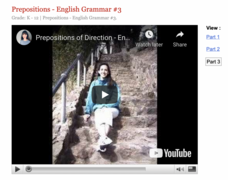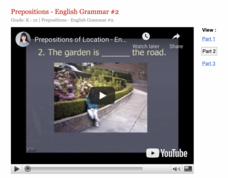Curated OER
Basic English Grammar - The Simple Past Tense #4
Practice forming questions and pronouncing them correctly in part four of Basic English Grammar - The Simple Past Tense. Questions are formed based on the subject and the object from part three. Scrambled sentences are given to put in...
Curated OER
Basic English Grammar - The Simple Past Tense #2
In part two of "Basic English Grammar - The Simple Past Tense," the reason to use simple past tense is explained more thoroughly. The same video from part one is shown with questions focusing on the reason the past tense is used....
Curated OER
Basic English Grammar - The Simple Past Tense #3
Part three of Basic English Grammar concentrates on asking questions in the simple past tense. A review using a different scenario covers types of past tense verbs, asking learners to fill in the correct form of the verb in various...
Curated OER
Prepositions - English Grammar #3
Finish the series on prepositions of location and direction in this video. Direction and location are distinguished with a description and a vignette at the local playground. Viewers then see a statement and choose the correct...
Curated OER
Prepositions - English Grammar #2
Continue learning about prepositions of location and direction in part two with Jennifer. Different prepositions are discussed with the same fill-in-the-blank format from part one. The video ends with questions where the viewer chooses...
Curated OER
Basic English Grammar - The Simple Past Tense #1
Listen to a few sentences describing the actions of the person shown. The sentences are then written in the past-tense for you to see and identify the simple past-tense verbs. Regular and irregular verbs are then defined with sentences...
Curated OER
Prepositions - English Grammar #1
Discover how to use prepositions in order to talk about location and direction. Definitions of prepositions, prepositional phrases, noun phrases, and more are given. Separate prepositions are then discussed and used in sentences....
Rockin' English Lessons
"A and An Song"–English Lesson for "A and An"–Rockin' English
The catchy beat and informative lyrics of this video support grammar instruction of indefinite articles a and an. As the song plays in the background, sentences and charts showcased when to use a or an with vowels or consonants.
Rock A Lingua
Preposiciones (Prepositions of Place)
It's one of the most important questions a student will have —¿dónde está mi tarea? Watch a short Spanish video on prepositions that shows a boy desperately searching every possible location for his missing homework.
Curated OER
Participial Phrases and Participles as Adjectives
Participles can be part of a verb phrase (participial phrase) or act as an adjective. Yossarian the Grammarian demonstrates how the verb "to wear" functions differently in various sentences.
Curated OER
What Adjectives Are
Review the definition of an adjective. Adjectives modify nouns, and Yossarian the Grammarian shows the three questions adjectives answer: Which one? What kind of? and How many?
Curated OER
Transitive Verbs and Direct Objects
Yossarian the Grammarian shows us that transitive verbs have a direct object, while intransitive verbs do not. Sentences are written out to illustrate his point.
Curated OER
What a Verb Is, and What Verbs Aren't
How do you define a verb? A verb has a subject. It is not always accurate to just look for the action. Using a complex sentence written on a whiteboard, Yossarian the Grammarian points out the possible verbs that people see, and what the...
Curated OER
Copulative Verbs and Subjective Complements
Copulative verbs, also known as linking verbs, "link" subjective complements and the original noun, basically renaming the noun. The copulative verb acts like an equal sign. Follow Yossarian the Grammarian as he explains several sentence...
Curated OER
Gerunds and Gerund Phrases
The gerund is described as just like the present participle by Yossarian the Grammarian. Look for the -ing ending to discover where the gerund is in the sentence.
Curated OER
The Preposition and Prepositional Phrase
Clarify what a preposition truly is. Prepositions come before some noun (object of the preposition) and together with that noun, to make prepositional phrases. The phrases work as adjectives or adverbs, more like a single word. Yossarian...
Curated OER
Active Voice and Passive Voice
Identify the subject of the verb and the agent (whatever is doing the action), and you will be able to discern if your sentence is written in the active or passive voice. Yossarian the Grammarian demonstrates by writing examples of each...
Rock A Lingua
Las Frutas (Fruits)
¿Te gustan las fresas? ¿Las uvas? ¿Qué hay de los higos? Learn the names for eight different kids of fruit with a fun Spanish video, which advises viewers to eat their fruit in order to grow healthy and strong.
Curated OER
Infinitive Phrases
Yossarian the Grammarian describes the infinitive as either an adjective, adverb, or noun. A sentence is given for each example on the whiteboard, comparing the infinitive to other adjectives, adverbs, and nouns so that the function of...
Curated OER
More on Restrictive Elements and Punctuation
Continue your look at restrictive and non-restrictive clauses and the use of commas with Yossarian the Grammarian. Non-restrictive means that no new information is being added to your sentence, therefore commas are necessary.
Curated OER
Indirect Objects and Objective Complements
Start by looking at the main action to discern what the direct object is. The indirect object does not receive the action, but is related to the direct object. Furthermore, the objective complement is displayed where the direct object...
Curated OER
Punctuation Basics - Restrictive and Non-Restrictive
Commas have many different functions: they combine items in a list, set off nonrestrictive clauses, and more. The restrictive clause is comprehensively covered by Yossarian the Grammarian.
Curated OER
Coordinating Conjunctions and Comma Splices
Use the mnemonic FANBOYS in order to avoid comma splices by connecting nouns and independent clauses with coordinating conjunctions. Yossarian the Grammarian gives sentence examples that included coordinating conjunctions.
Curated OER
The Nominal Phrase
A nominal phrase consists of two verbs that function as a noun, according to Yossarian the Grammarian. He explains various parts of speech in two sentence examples written on a whiteboard.
Other popular searches
- Middle School Grammar Games
- English Grammar Games
- Grammar Games Imperatives
- Christmas Grammar Games
- Online Grammar Games
- Language Arts Grammar Games
- On Line Grammar Games
- Capitalization Grammar Games
- Grammar Games Can Must
- Grammar Games Blackboard
- Grammar Games + Blackboard
- Esl Grammar Games Permission

























